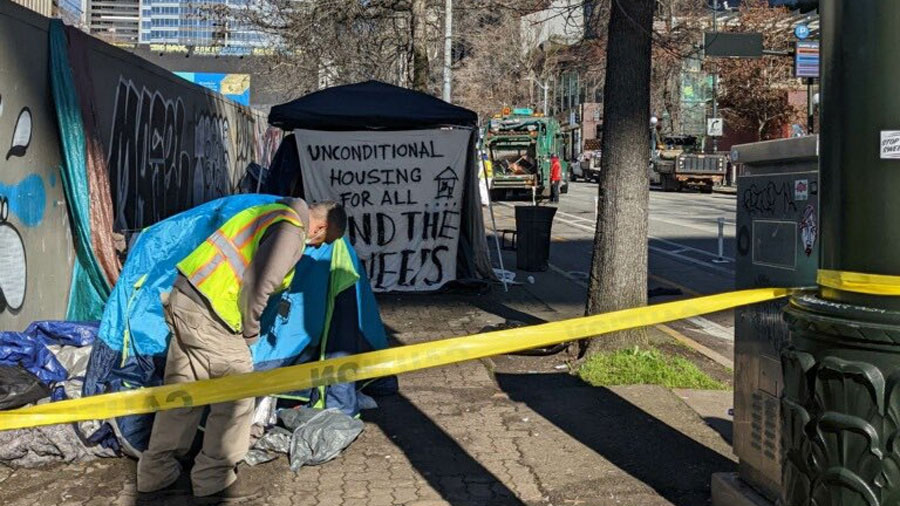Amanda Knox testifies in Olympia about police interrogation bill
Jan 21, 2024, 5:08 AM | Updated: 10:17 am

American Amanda Knox delivers a speech during a panel session entitled "Trial by Media" during the first edition of the Criminal Justice Festival, an event organized by The Italy Innocence Project and the local association of barristers, on June 15, 2019 in Modena, Italy. (Photo: Emanuele Cremaschi, Getty Images)
(Photo: Emanuele Cremaschi, Getty Images)
A House committee in Olympia has postponed a vote on a bill that featured testimony from one of the world’s most prominent wrongly convicted individuals, Amanda Knox.
House Bill 1062 seeks to remove deception as a tactic by law enforcement to elicit a confession during custodial interrogations.
The bill aims to ensure that statements obtained through deceptive means are not automatically admissible as evidence, marking a departure from the current legal landscape.
Nine states currently have similar laws, but they only apply to juveniles. This would be the first law of its type in the country that applies to adults.
“If you are in custody and you’re being interviewed or interrogated by a police officer, they have the right to lie to you. You do not have the right, of course, to lie to a police officer. That can add extra charges,” Rep. Strom Peterson, D-Edmonds, said.
The bill is being led by Democrats as no Republicans have signed on as co-sponsors. The House Community Safety, Justice, & Reentry Committee delayed a vote on Thursday after several amendments and a substitute bill were submitted that made substantial changes.
Amanda Knox testifies on behalf of the bill
During its initial public hearing this week, Amanda Knox, who was accused — and initially convicted — of killing her British roommate in November 2007, in Perugia, Italy, testified on behalf of the bill.
“I was subjected to 53 hours of questioning over five days in a foreign language without legal counsel,” she told the committee.
Knox was later acquitted in the murder case, but only after she spent four years in an Italian prison. But the nation’s highest court also confirmed the damaging 2011 slander conviction — which included a three-year prison sentence — against Knox for falsely accusing Congolese bar owner Patrick Lumumba of the murder. Knox sometimes worked at the establishment Lumumba owned.
She is set to be tried again on the slander conviction.
‘This is a good thing’: Washington’s Amanda Knox to go on trial again in Italy
“The worst day of that entire ordeal was the day that I was interrogated overnight by police officers who claimed to have evidence against me, who claimed that there were witnesses who could place me at the crime scene. They lied to me. I did not know they could lie to me,” she said.
In 2019, the European Court of Human Rights in Strasbourg, France, ordered Italy to pay Knox financial damages — 18,400 euros ($20,000) — for police failure to provide legal assistance and an independent interpreter during a long night of questioning following Kercher’s murder.
Knox testified that the tactics Italian police used on her are universal, and she would like to eliminate those techniques in Washington, where she currently lives.
“By the end of my interrogation, I thought I was insane because of how they gaslit me,” Knox said. “This is the greatest issue for me when it comes to resolving issues of wrongful convictions.”
Peterson wants to eliminate law enforcement’s ability to trick someone into a confession by falsifying statements.
Custodial interrogation, as defined in the bill, pertains to the questioning actions or words used by an officer to elicit incriminating responses from individuals who are in custody or otherwise significantly deprived of freedom of action.
Before engaging in such interrogations, officers are required to provide the subject with a Miranda warning, outlining their constitutional rights, including the right to remain silent and the right to an attorney.
Waiving these rights is permissible, but only if done voluntarily, knowingly and intelligently.
House Bill 1062 seeks to make statements made during a custodial interrogation inadmissible if the court determines that the interrogating officer intentionally engaged in deception to obtain the statement.
“Deceptive interrogation techniques and practices are incredibly common,” said Lara Zarowsky, executive director of the Washington Innocence Project.
Looking at the Reid Technique
Two law enforcement consultants that support the bill told the committee the Reid Technique is used quite often during interrogations because it’s extremely effective.
It is known as a false evidence ploy where officers tell suspects they have proof of their guilt, but in reality, they don’t.
If a suspect confesses, they may also be given promises of a light sentence and more access to family members while in custody.
That’s what happened to Ted Bradford, who in 2010 became the state’s first DNA exoneration.
In 1996, he was convicted of sexual assault and spent 10 years in prison until DNA evidence proved he was innocent.
He told the committee he endured a nine-and-a-half-hour interrogation by the Yakima Police Department and was told constantly, “We know you did it.”
“I was told that there was evidence at the crime scene left by the perpetrator. And that when they tested that, they said it’s going to prove that you did it. So you might as well confess,” says Bradford, who was 22 at the time.
“I knew I was innocent. And the only way I could see an out of that situation, because believe me, that’s all I wanted, was to agree to be out of that room would be to agree. I thought the test would prove I didn’t do it,” Bradford said.
Bradford added members of the department lied about the DNA evidence.
More from Matt Markovich: House Bill 1958 addresses ‘stealthing’ in sexual activity
“Sometimes it’s an unfortunate reality; we have to lie to people to get them to tell the truth,” James McMahon, policy director with the Association of Sheriffs and Police Chiefs, told the committee.
“If we could somehow get people to actually be required to tell us the truth, we wouldn’t have to lie. That’s the unfortunate reality of law enforcement,” he added.
McMahon opposed the bill, saying existing laws prevent police officers from using coercion techniques to extract a confession.
“We lie to protect ongoing criminal investigations. We lie to protect confidential informants, undercover investigations, all of those sorts of things,” McMahon said.
Knox wrapped up her testimony saying the world’s attention on her life if something like HB 1062 were part of Italian law.
“I believe that if I had not been lied to by the police, none of this would have ever happened. I never would have been put on trial, I never would have gone to prison,” Knox said.
The committee will debate changes to the law on Jan. 23.
Contributing: Steve Coogan, MyNorthwest; The Associated Press
Matt Markovich often covers the state legislature and public policy for KIRO Newsradio. You can read more of Matt’s stories here. Follow him on X, formerly known as Twitter, or email him here.













